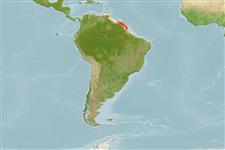>
Ophidiiformes (Cusk eels) >
Ophidiidae (Cusk-eels) > Ophidiinae
Etymology: Lepophidium: Latin, lepus, leporis = rabbit + Greek, ophis = serpent (Ref. 45335); collettei: Named for Bruce B. Collette..
Environment: milieu / climate zone / depth range / distribution range
экология
морской демерсальный; пределы глубины 7 - 66 m (Ref. 91765). Tropical; 12°N - 1°S, 64°W - 45°W (Ref. 91765)
Western Atlantic: Shelf waters off the mouth of the Amazon and along the Guianan coast to the Gulf of Paria between Trinidad and Venezuela.
Size / Вес / Возраст
Maturity: Lm ? range ? - ? cm
Max length : 16.4 cm SL самец/пол неопределен; (Ref. 91765)
Краткое описание
морфология | морфометрия
членистые (мягкие) лучи спинного плавника (общее число): 116-122; членистые (мягкие) лучи анального плавника: 96 - 103; позвонки: 65 - 69. This species can be distinguished from all its congeners on the basis of vertebral counts (only Lepophidium aporrhox has fewer vertebrae than L. collettei with no overlap in number of precaudal vertebrae, 14-15 vs. 12-13 in L. aporrhox). L. collettei differs further from L. aporrhox in dorsal rays (116-122 vs. 106-115), rudiments on lower gill arch (2-7 vs. 8-12), length of the long (9-11% vs. 13-18%) and short pelvic rays (5-7% vs. 8-12%) in SL; differs from L. brevibarbe in the absence of a distally expanded anterior rib in males or haltere as seen in L. brevibarbe, developed rakers on the lower gill arch (6-8 vs. 4-5), and in having a deeper body; from L. gilmorei by the average number of caeca (5.4 vs. 3.2), total gill raker elements (12-17 vs. 8-9), dorsal fin origin (between neural spines 4-5 and 5-6 vs. between 3-4); from L. marmoratum by caudal vertebrae (51-54 vs. 55-58), short pelvic rays as a percentage of standard length (5-7% vs. 8-12%), and lack of dark spots on the head and body, in rows or otherwise; from the Pacific L. microlepis by average head length (20.8% vs. 24.3% in SL) and long pelvic rays (9-11% vs. 5-8% in SL); on the basis of dorsal rays (116-122), from L. pheromystax (125-133), L. robustum (123-126), and L. stigmatistium (123-131) Ref. 91765.
Life cycle and mating behavior
половая зрелость | размножение | нерест | икра | Fecundity | личинки
Robins, C.R., R.H. Robins and M.E. Brown, 2012. A revision of Lepophidium (Teleoastei, Ophidiidae), with descriptions of eight new species. Bulletin of the Florida Museum of Natural History 52(1):1-94. (Ref. 91765)
Статус Красного Списка МСОП (Ref. 130435)
Угроза для людей
Harmless
Использование человеком
дополнительная информация
народные названиясинонимыобмен веществхищникиэкотоксикологияразмножениеполовая зрелостьнерестSpawning aggregationFecundityикраРазвитие икры
Возраст/РазмерыростЗависимость между длиной и массой телаЗависимость между длинамиРазмерный составморфометрияморфологияличинкидинамика численности личинокпополнениечисленностьBRUVS
ссылкиаквакультура (рыбоводство)особенности рыбоводствастепень растяжениягенетикаElectrophoresesнаследуемостьболезниобработкаNutrientsMass conversion
соавторыизображенияStamps, Coins Misc.звукиCiguateraскоростьтип плаванияжаберная областьOtolithsмозгзрение
инструменты
Специальные отчеты
Скачать в формате XML
ресурсы в Интернет
Estimates based on models
Preferred temperature (Ref.
123201): 26.6 - 28, mean 27.4 °C (based on 60 cells).
Phylogenetic diversity index (Ref.
82804): PD
50 = 0.5000 [Uniqueness, from 0.5 = low to 2.0 = high].
Bayesian length-weight: a=0.00102 (0.00046 - 0.00225), b=3.06 (2.88 - 3.24), in cm total length, based on all LWR estimates for this body shape (Ref.
93245).
Trophic level (Ref.
69278): 3.5 ±0.7 se; based on size and trophs of closest relatives
устойчивость к внешним воздействиям (Ref.
120179): высокий, минимальное время удвоения популяции до 15 месяцев (Preliminary K or Fecundity.).
Fishing Vulnerability (Ref.
59153): Low vulnerability (10 of 100).
